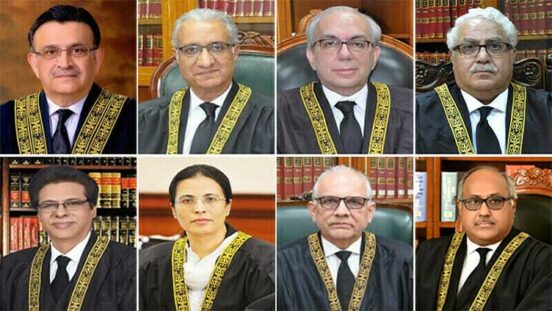ISLAMABAD -UNS: Chief Justice of Pakistan (CJP) Umar Ata Bandial observed on Tuesday that an independent judiciary was a main component of the Constitution.
He made the remarks as an eight-member larger bench of the Supreme Court heard a set of plea challenging a bill, which has since become an act of Parliament, seeking to curtail the powers of the CJP.
The bench comprised CJP Umar Ata Bandial, Justice Ijazul Ahsan, Justice Munib Akhtar, Justice Mazahar Ali Akbar Naqvi, Justice Muhammad Ali Mazhar, Justice Ayesha Malik, Justice Syed Hasan Azhar Rizvi and Justice Shahid Waheed.
The three petitions were filed under Article 184(3) of the Constitution by Advocate Muhammad Shafay Munir, Raja Amer Khan, Chaudhry Ghulam Hussain and others.
The bill proposes taking away the individual authority of the chief justice to initiate suo motu proceedings and unilaterally form benches and vests them in a panel comprising the CJP and two senior-most SC judges. It also calls for the right to appeal suo motu decisions.
Action on the bill was preemptively frozen by the court even before it became law last month.
Barrister Salahuddin appeared on behalf of the PML-N while Farooq Naek appeared on behalf of the PPP. Meanwhile, Hassan Raza Pasha represented the Pakistan bar Council (PBC).
At the outset of the hearing, the CJP said that the previous order issued by the court was of an interim nature. He said that democracy was a key component of the country’s Constitution.
“A free judiciary and Centre are also important features of the Constitution,” he said, adding that the case at hand concerned the independence of the judiciary.
CJP Bandial said that the court expected “serious arguments” from the parties in the case, adding that the large bench would have to provide “excellent assistance”.
CJP Bandial also remarked that the law in question was the first of its kind in Pakistan. “This law concerns the third pillar of the state,” he said.
He said that there was no changing the fact that an independent judiciary was a main feature of the Constitution. “It is being alleged that for the first time, a fundamental component of the Constitution has been violated through a [piece of] legislation.”
The court then sought detailed answers from all parties in the case on May 8. The court also sought the parliamentary record of the law as well as the arguments in the relevant standing committee.
During the hearing, the PBC’s lawyer contended that the council had always fought for the rule of law and the judiciary. “It would be appropriate if a full court is constituted to hear the case,” he said, adding that no one would object to a bench which included seven senior-most judges.
He also highlighted that several references had been filed against one of the members of the current SC bench in the Supreme Judicial Council (SJC) and called for Justice Naqvi to be excluded from the bench.
Justice Bandial remarked that constituting a full court was the CJP’s prerogative. He went on to say that a reference could not bar a judge from working.
“A judge can’t be stopped from working until the SJC gives its opinion,” the CJP said, adding that the court had made the same decision during the proceedings against Justice Qazi Faez Isa.
“Complaints against judges, including me, come from time to time,” the CJP said, adding that political matters had “polluted” the top court’s environment.
“Political people want favourable decisions, not justice,” he said. He noted that a demand for constituting a full court had also been put forth during the hearing of the case concerning holding elections in the country.
He observed that all the country’s institutions were bound to implement the directives issued by the top court. The PBC’s request for a full court was subsequently rejected.
The court also rejected the attorney general’s request for vacating the anticipatory injunction on the law.
“First, explain to us what the law is and why it was made,” the CJP said. The hearing was then adjourned for May 8 (Monday).




